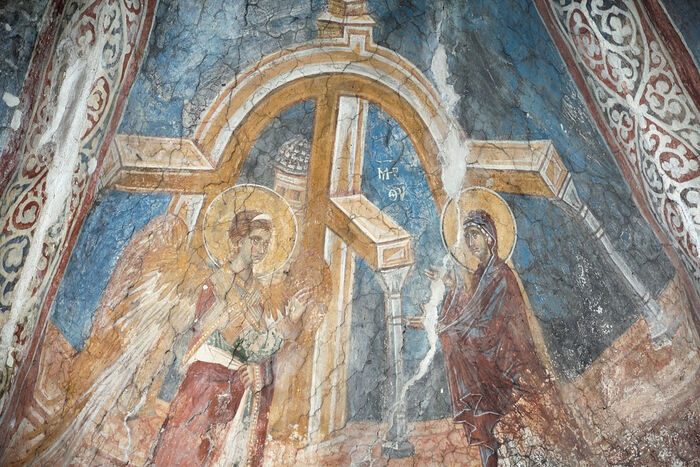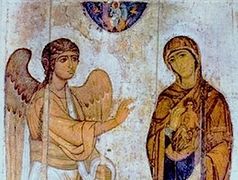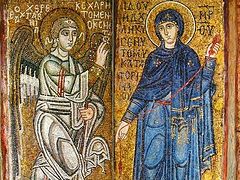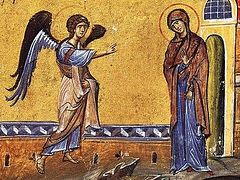Today has come joy for all, rewarding our former sorrow: The Omnipresent One has appeared to fulfill all joy. But how has He appeared? Not with body guards, not in the company of angelic armies, not with pomp and clatter, but quietly and serenely, in order to conceal His coming from the prince of darkness and by wise cunning, having caught the snake and laughed at the vigilance of that Assyrian dragon who had enslaved the man’s noble nature, steal away his prey. His unspeakably great mercy did not wish to see the loss of such a creation as man, for whom He spread the heavenly firmament, established the earth, poured forth the air, formed the seas, and ordered all visible creation. Therefore does God appear on earth—God from the heavens, God amongst men, God in the Virgin’s womb—He Whom the whole universe cannot contain. Now the nature of man receives a foretaste of joy and the beginning of deification; now, casting off the illusory riches of sin, it is betrothed to the Creator. Now our original composition takes on a new appearance, and the aged world puts off its decrepitude, the fruit of sin. Drop down, ye heavens, from above, and let the skies pour down righteousness (Is. 45:8), Sing, O heavens; and be joyful, O earth; and break forth into singing, O mountains: for the Lord hath comforted his people, and will have mercy upon his afflicted (Is. 49:13). Today the mystery that was sealed before all ages is revealed, and all receive restoration in Christ. Today the omnipotent power of the Creator of the universe brings to final fulfillment the counsel held by Him on creation of the world, that He might destroy the counsel composed by the prince of evil against us from ancient times. Therefore do the angels rejoice, and men with them, and the whole renewed world comes to itself. What mind, what tongue can express this? Neither do words have the strength to express, nor hearing to perceive this. Thus do we justly celebrate the present solemnity with gladness and joy, feasting (the Lord’s) most perfect reception of our mingling.
But what is this solemnity and of what nature is it? It is the joy of all creatures and the restoration of our race. Today are the glad tidings of joy, the testimony of God’s love for man, the joyful preaching of the salvation of the whole world. From whence, from whom, and to whom? From the heavens, from God, to the Virgin, betrothed to a husband. Who is this Virgin? Who is this husband? What are their names? The Virgin is Mary, the husband is Joseph; both are of the lineage of David. Who is the fulfiller of the divine command, and whence does he come? Archangel Gabriel, sent from on high to serve in the miracle: the servant of the Most High, flown down from the higher countries to earth, to proclaim the most amazing mystery in comparison with all that are worthy of amazement. And what, precisely? The descent of the Lord, His inexpressible care for us, the revelation and confirmation of His divine counsel and foreknowledge, although hidden from the ages. But where, when, and for what? In Nazareth of Galilee, in the sixth month after John was conceived, so that he might proclaim the incarnation of the coming Lord. Thus, having flown down from the habitations on high to the countries of the earth, he appeared in Nazareth; and coming to the Virgin He meekly announced to her God’s inexpressible care. In this consists the mystery of God’s making peace with men. Here is the object of the present solemnity—the union of God with men, the deification of the nature He has taken on, the renewal of our image, the exchange of our state for a better one, our exaltation and ascent to the heavens. Therefore are all now filled with joy, and all the mental powers of the heavenly ranks unite with us at our having made peace with God. Our return to God is pleasant to them, as is our transfer and ascent to a better state—for they are greatly compassionate and loving, which is why they are sent to the service of those who must “inherit salvation” (cf. Heb. 1:14). Thus do all things make glad today, and nature exalts! Today the heavens open, and the earth invisibly receives the King of all. Nazareth competes with Eden, and receives into its bowels He Who planted Eden. The Father of mercy betroths human poverty to His one and only-begotten Son, Gabriel serves the mystery and calls to the Virgin, “Rejoice” (cf. Lk. 1:28), so that the daughter of Adam, who came from the lineage of David, would return the joy that her foremother lost. Today the Father of glory, taking pity on the human race, with His merciful eye looks upon the corrupted nature in Adam. Today the Giver of mercy reveals to us the abyss of His all-good bounties and pours upon our nature such abundant mercy as the abundance of water that fills the ocean. To the one from Whom, through Whom, and in Whom everything exists, belonged the task of changing to mercy the ancient sentence of the curse against us, to glorify with His glory our nature made inglorious in Adam and to destroy by truth the cunning advice of the Father of Lies, the consequences of which was the first crime—that is, the fall of Adam’s race.
Of this did the great among kings, the forefather of God David prophetically sing: Mercy and truth have met each other, righteousness and peace have kissed each other (Ps. 84:11). In saying this, did he not mean the mercy which, by the Father’s good will, showed to us His Son, the Giver of mercy, out of pity for us becoming like us in everything in order to take away our transgression, raise us up from our fall, and correct anew what had been shattered. What is truth if not that His appearance to men was not some sort of phantom? He did not only take on human form, as some say; but moved by His love for mankind and condescending to people, He the unfathomable in very truth assimilated into Himself human essence and deified in Himself our common nature, which He had taken on. His care was not a phantom, for although His divine nature is unchangeable, He had a real body.
For inasmuch as “mercy and truth”, according to the words of the Prophet, “have met each other”, then “truth and peace, as is fitting, have kissed each other.” “Truth” is a definition pronounced against the seducer of our forefathers. When and by whom? Today, by the Most High Father. According to this truth, He, man-loving in essence, ordained that His Only-Begotten Son, Who appeared in the image of man, condemn the enemy. “Peace”—is that peace, which in the hour when the Ruler of the world, the Son (of God) was born in the flesh, the hosts of angels sang as one voice, crying out: Glory to God in the highest and on earth peace, good will toward men (Lk. 2:14)—that glory by which the human race has been glorified through Christ and raised up—as the great apostle says—far above all principality, and power, and might, and dominion (Eph. 1:21); the earth that He Himself interceded with for us by uniting the heavenly with the earthly and revealing to those born on earth a new way of ascent to the heavens; that good will by which it was pleasing to the Father to send us His beloved Son who was condemned (to death), so that—having one will with the Father—He would effect our salvation preordained to us from the Father through Him. This is the object of our solemnity today! This is the important commandment that Gabriel now fulfills. And as the intermediate between the Godhead and mankind, he is the first to proclaim to the Virgin the guarantee of perfect reconciliation!




